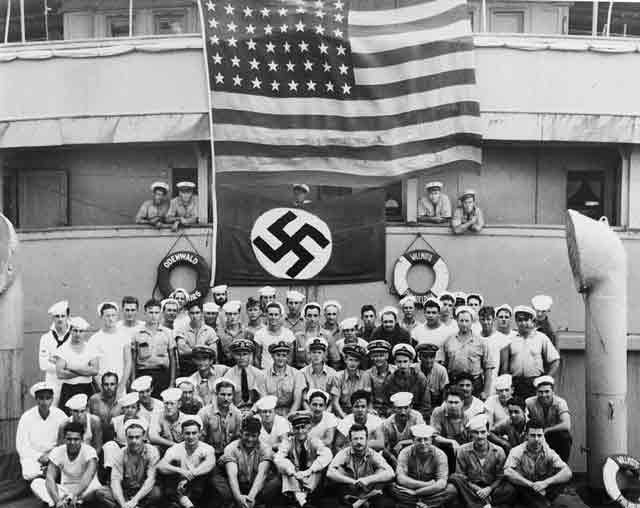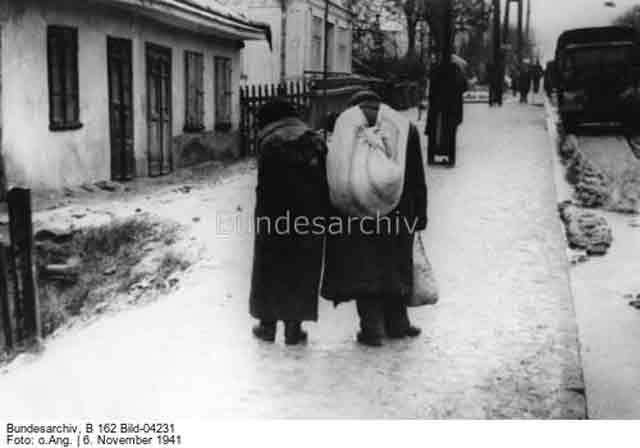Thursday 6 November 1941
 |
| "Standing in a scout car, the Prime Minister inspects Valentine tanks and crews of 11th Armoured Division at Helmsley in Yorkshire, 6 November 1941." © IWM (H 15377). |
 |
| Stalin delivers his radio broadcast of 6 November 1941 (capture from a film of the event). |
 |
| "Buheirat-Murrat-el-Kubra, Egypt. November 1941. The wreckage of the crashed Wellington U for Uncle of No. 148 Squadron RAF, at Landing Ground 60 on the edge of Great Bitter Lake on 6 November 1941. 404110 Pilot Officer (PO) Hugh McMaster, pilot, was killed in the crash aged twenty-five. He is buried in the Fayid War Cemetery in Egypt." Australian War Memorial P03249.002. |
The enemy has seized a large part of the Ukraine, Byelorussia, Moldavia Lithuania, Latvia, Esthonia and a number of other regions, has forced his way into the Donetz Basin, hangs like a black cloud over Leningrad and is threatening our glorious capital, Moscow.This is a very accurate summary of the situation - though Stalin does not mention the Crimea or territory lost to Finland. What he lists is bad enough and a rare dose of honesty for the Soviet people.
 |
| "Crewmembers of the U.S. Navy heavy cruiser USS Omaha (CL-4) pose with U.S. and German flags, onboard the captured German blockade runner Odenwald, in the South Atlantic, 18 November 1941. Life rings are presently bearing the names Odenwald of Hamburg (Germany), and Willmoto of Philadelphia (USA). The German ship had attempted to disguise herself as the Willmoto, an American-flag merchant steamer. Odenwald was seized by Omaha and the destroyer USS Somers (DD-381) on 6 November 1941." This seizure of the Odenwald is of dubious legality but is later justified by U.S. courts as being a "salvage operation" after the German crew of the Odenwald attempted to scuttle the ship - because of the presence of USS Omaha. This is the last US Navy seizure in which the crew receives prize bonuses (US Navy History and Heritage Command). |
In four months of war we have lost 350,000 in killed, and 378,000 missing, and our wounded number 1,020,000. In the same period the enemy has in killed, wounded and prisoners lost more than four and a half million men.While German losses have indeed been heavy, they are nowhere near four million men - which is a million soldiers more than the Wehrmacht began the war with. Soviet losses at Kyiv alone totaled roughly the numbers that Stalin gives for killed and missing for the entire conflict to date. Certainly, Stalin has better information than this available to him, but it sounds better to say that German losses exceed Soviet losses when the reverse is true.
 |
| Jewish residents of Rivne, Ukraine who have been classified as "old and infirm" with their luggage on the way to collection points. They are to be taken to the Sosenki forest outside of Rivne and massacred over the next two days along with about 15,000-18,000 others (Federal Archive B 162 picture-04231). |
One of the reasons for the reverses of the Red Army is the absence of a second front in Europe against the German-fascist troops. The fact of the matter is that at the present time there are still no armies of Great Britain or the United States of America on the European continent to wage war against the German-fascist troops, with the result that the Germans are not compelled to dissipate their forces and to wage war on two fronts, in the West and in the East. Well, the effect of this is that the Germans, considering their rear in the West secure, are able to move all their troops and the troops of their allies in Europe against our country.Then, Stalin completely omits the help that the Allies actually are giving the Soviet Union, which is Lend-Lease supplies. After noting that "the Germans are producing considerably more tanks," he says:
There is only one way of nullifying the Germans’ superiority in tanks and thus radically improving the position of our army. This way is, not only to increase the output of tanks in our country several times over, but also sharply to increase the production of anti-tank aircraft, anti-tank riffles and guns, and anti-tank grenades and mortars, and to construct more anti-tank trenches and every other kind of anti-tank obstacle.It is a jaw-dropping exercise in blame-shifting by Stalin. Although Germany is invading, the root cause of the USSR's troubles, Stalin very strongly implies, is the failure of the Western Allies to help out. Not only is there no second front, but they aren't giving any other help, either (at least according to this speech). This curious anti-Western attitude is one that Stalin will retain throughout the war and in the post-war years as well. Thus, this speech of 6 November 1941 casts a very long shadow that extends well past 1945.
 |
| "Odenwald Incident, November 6, 1941. View taken from Odenwald's bridge shows USS Omaha (CL-4) escorting the captured blockade runner to Puerto Rico." Naval History and Heritage Command. |
November 1941
November 2, 1941: Manstein Isolates Sevastopol
November 3, 1941: Japan Prepares to Attack
November 4, 1941: German Advances in the South
November 5, 1941: Last Peace Effort By Japan
November 6, 1941: Stalin Casts Blame in an Unexpected Direction
November 7, 1941: Stalin's Big Parade
November 8, 1941: Germans Take Tikhvin
November 9, 1941: Duisburg Convoy Destruction
November 10, 1941: Manstein Attacks Sevastopol
November 11, 1941: Finland's Double Game Erupts
November 12, 1941: T-34 Tanks Take Charge
November 13, 1941: German Orsha Conference
November 14, 1941: German Supply Network Breaking Down
November 15, 1941: Operation Typhoon Resumes
November 16, 1941: Manstein Captures Kerch
November 17, 1941: Finland Halts Operations
November 18, 1941: British Operation Crusader
November 19, 1941: Sydney vs. Kormoran Duel
November 20, 1941: The US Rejects Final Japanese Demand
November 21, 1941: Germans Take Rostov
November 22, 1941: Kleist in Trouble at Rostov
November 23, 1941: Germans Take Klin, Huge Battle in North Africa
November 24, 1941: Rommel Counterattacks
November 25, 1941: HMS Barham Sunk
November 26, 1941: Japanese Fleet Sails
November 27, 1941: British Relieve Tobruk
November 28, 1941: Rostov Evacuated, German Closest Approach to Moscow
November 29, 1941: Hitler Furious About Retreat
November 30, 1941: Japan Sets the Date for its Attack
2020
No comments:
Post a Comment